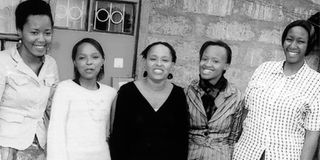Restoring the dignity of women

Mary Njoki (centre) with her daughter, Joan (second left) and friends Mary Ann, Joan and Susan. She feels liberated following a procedure to correct a fistula.
Photos/James Nyaga
“Please don’t cry, I am fine now.” These are the comforting words Mary Njoki Ng’ang’a says to Mary Ann Njeri, as the two friends cling to each other.
When the two last met, it was to wonder long and hard about how to resolve Njoki’s predicament then. In her own words, “vesico-vaginal fistula (VVF) is the worst thing that can ever happen to a woman.”
Because of this condition, in which a person suffers urine incontinence, Njoki lost her dignity and at one time even contemplated suicide. In her community, the condition would have been explained as a curse and a bad omen for the family.
“Just think, a grown woman, married with children, wetting her bed; think about passing urine and not even knowing it!” she says. “I felt embarrassed and even stopped attending social events, including church.”
Njoki’s neighbour, Susan Wanjiru, says she sensed something was wrong due to the frequent visits to the toilet Njoki made. “She visited the toilet too often, and I decided to ask her what was wrong. But it took some persuading before she finally let me in on her closely guarded secret.”
Today, thanks to an AMREF partnership with the Kenyatta National Hospital (KNH) that intervened and cured her embarrassing condition, Njoki can share her past ordeal, if only for the sake of other women similarly suffering from loss of dignity.
Her problem dates back to April 2003, when she was admitted in hospital for the birth of her second child. Although she understood that she would have to deliver through a Caesarean section, she didn’t have the slightest suspicion that the baby would come close to dying or that her rhythm of life would be completely altered.
The baby weighed 2750g at birth, with such a low Apgar score (used to determine the condition of an infant at birth, including the heart rate, breathing effort, muscle tone, response to stimulation and colour) that the doctors gave her little chance of survival. It was to be nine days before Njoki saw her new-born daughter.
“Things were so bad that we were prepared to go home without the baby,” she says. “When I came out of theatre, my husband didn’t tell me what he had been told, but from the way he looked at me, I sensed something was wrong.”
Njoki says she finally confronted her husband over the baby’s state and it took him “enormous courage” to disclose the sad information. “Doctors said our daughter had little chance of living, and even if she did, she risked developing cerebral palsy.”
The couple would chat for hours about life with only one child, their first daughter, then aged seven years. Njoki’s greatest fear was going back home and facing her neighbours empty-handed after nine months of pregnancy. So intense was this fear that instead of the usual excitement, she cried when she first saw her baby.
After about two weeks of hospitalisation mother and child were discharged. Against all odds and despite what the doctors had said, the baby was to grow into the healthy five-year-old she is now.
But as for the mother – she suffered a ruptured uterus and bladder during the delivery, and this was to become a great source of torment. Her mood alternated between joy as she watched the baby grow, and sadness as a result of constantly wetting herself.
“I have no words with which to thank my husband, who comforted me and raised my spirits whenever I was down,” she says.
After seven agonising months, during which she developed ulcers and diabetes, Njoki decided to let it all out. “I had never fully disclosed to my sister what I was going through” she reveals, “but when I did, she immediately organised for an appointment at KNH. I am grateful that she was so understanding.”
The doctor who examined her was just as understanding. “He didn’t bombard me with unnecessary or embarrassing questions,” says Njoki. “We developed a good communication, which helped a great deal.”
The operation to correct the problem was performed in December 2003. “For the first time I could visit the toilet when I wanted. I regained my pride and dignity. I could stand and go about my daily chores without fear. It was liberating,” she says.
The first two years following the operation passed pleasantly… until she noticed a foul smell emanating from her private parts again.
It seemed the nightmare was back, and she was on the verge of keeping it to herself again. But then she decided not to suffer as she had before and went straight to the hospital. It was a huge relief to discover there was actually a free screening and treatment programme between AMREF and KNH, who came to her aid in August this year.
The problem was that there was initially a double rupture, but only one had been repaired. Having seen the success of the first operation, her whole family rallied behind her and she has had no problems to date following the second procedure to repair the rupturing.
It is because of the isolation she suffered that Njoki decided to talk openly about her months of hell. “I want other sufferers to be liberated as well,” she says.




